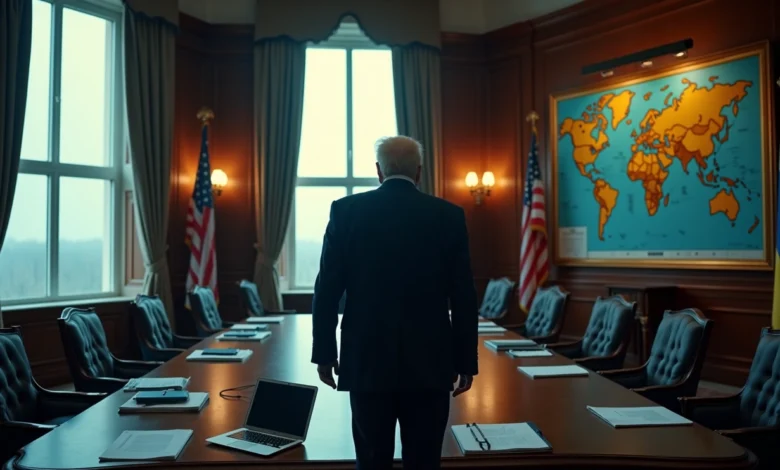
Trump’s Ukraine Peace Plan Crumbles as Middle East Strategy Faces Crisis
Putin’s repeated rejection of ceasefire proposals accepted by Ukrainian President Volodymyr Zelenskyy has derailed Trump’s Ukraine peace efforts and now threatens his Middle East initiatives. The White House seemed ready to put more pressure on Moscow on three separate occasions, but diplomatic progress in Eastern Europe has hit a wall. The latest israel palestine war developments show a delicate ceasefire deal aimed to stop what many call a genocidal conflict with nearly 70,000 Palestinian casualties.
The path to lasting peace remains unclear after a devastating two-year period. The violence began when 1,200 Israelis and foreigners lost their lives on October 7, 2023. Palestinian deaths have since exceeded 67,000. Research indicates that 31 percent of wars between states end in stalemate under ceasefire deals, and most see minor breakdowns within 10 days. The complex israel palestine history makes peace harder to achieve, and Trump’s unexpected peace offering to Iran faces pushback. Both Hamas and Israel have agreed to the first stage of the Gaza deal, but key elements still need implementation. These include releasing prisoners, withdrawing Israeli forces, delivering humanitarian aid, and helping displaced Gazans return home.
Trump’s dual peace strategy begins to unravel

Image Source: Politico
Trump’s peace plans for two major global conflicts show signs of falling apart. His diplomatic efforts in both the Middle East and Ukraine face growing challenges.
Middle East ceasefire celebrated too soon
The excitement over Trump’s Middle East peace breakthrough didn’t last long. What everyone saw as a diplomatic win now struggles to take shape. Both Hamas and Israel accepted the first phase of the Gaza agreement on paper, but little has happened on the ground.
The agreement has hit several roadblocks:
- Delays plague prisoner releases
- Israeli forces stay put instead of pulling back
- Aid deliveries can’t get through
- Gaza’s people remain unable to return home
On top of that, Trump’s surprise move to reach out to Iran, which is vital to his regional plan, hasn’t worked well. Iran’s leaders show little interest in talking to America, especially as the israel gaza war update shows regional tensions remain high.
Ukraine negotiations hit wall with Russia’s refusal
The situation looks even worse in Eastern Europe. Putin has turned down peace proposals multiple times—the same ones Ukraine’s President Zelenskyy agreed to accept. Russia’s repeated refusals have brought Trump’s peace plan to a standstill.
The White House reached several points where they could have pushed Moscow harder, but each opportunity slipped away without results. Ukraine still waits for promised military and economic help. Advanced Tomahawk missile systems haven’t arrived, though their approval was announced long ago.
The conflict grows more intense as a result. Russian forces step up their attacks in eastern Ukraine, which goes against everything the peace talks stand for. Military experts say Russia wants to grab more land to strengthen its position before any real talks begin.
These failing peace efforts raise doubts about how the administration handles diplomacy. Former State Department officials say announcing diplomatic wins too early can hurt credibility when problems come up later. The White House still claims both initiatives can work, calling these “temporary setbacks” according to administration sources.
Iran and Russia reject Trump’s diplomatic overtures
Trump’s peace initiatives face mounting setbacks as major players openly reject his diplomatic outreach. Both Iran and Russia’s resistance creates new obstacles that make delicate negotiations even harder.
Tehran rebuffs Sharm el-Sheik invitation
Iranian leaders firmly said no to the proposed Sharm el-Sheik summit, which was the life-blood of Trump’s Middle East peace framework. Tehran swiftly rejected the formal invitation sent through Swiss diplomatic channels. Iranian Foreign Minister Mohammad Javad Zarif called the summit “a theatrical performance designed to create false impressions of progress.”
This rejection comes after months of failed behind-the-scenes talks. Sources close to the negotiations say Iranian officials don’t trust American intentions and point to America’s previous exit from the nuclear accord. Iran’s recent military exercises in the Persian Gulf show they won’t get involved under the current terms.
Putin delays talks while escalating attacks
Russian President Putin keeps avoiding diplomatic engagement. The Kremlin now points to “scheduling conflicts” for endless delays after three postponed virtual summit dates. Russian forces have stepped up their military operations in eastern Ukraine during this diplomatic standoff.
Intelligence confirms Russian forces have launched coordinated attacks in the Kharkiv and Donetsk regions. These actions go against all ceasefire discussions. Military experts believe Russia wants to gain more territory to strengthen its position before any real talks begin.
israel palestine history complicates regional trust
The complex israel palestine history makes Trump’s diplomatic initiatives harder. Regional leaders don’t fully trust American-led peace efforts because U.S. policy has changed so often over the decades. The latest israel palestine war update reveals ceasefire violations with occasional gunfire exchanges along Gaza’s northern border.
The recent israel gaza war update shows aid deliveries still face many roadblocks. These problems feed a deep distrust that goes beyond the immediate participants to include key regional powers whose support would make any lasting peace possible.
Iran and Russia’s rejection of Trump’s diplomatic strategy raises serious questions about his two-track peace approach.
Internal divisions and missed deadlines weaken Trump’s position
Trump’s peace initiatives face strong pushback both internally and externally as diplomatic challenges continue to mount.
Far-right Israeli factions resist peace terms
The Israeli coalition government’s hardline elements openly reject major concessions in the ceasefire agreement. Religious nationalist party ministers threaten to pull their support if the government restricts West Bank settlement expansion. These internal conflicts have slowed down vital humanitarian aid deliveries to northern Gaza, according to the latest israel gaza war update.
Trump’s delay on Tomahawk missiles frustrates Ukraine
The Pentagon’s approval process for promised Tomahawk missile systems now stretches into its third month without delivery. Ukrainian military leaders grow increasingly frustrated as Russian forces push forward in eastern territories. Defense experts note that Ukraine’s defensive capabilities remain nowhere near adequate without these advanced weapon systems.
India’s oil trade with Russia undermines sanctions
Russian oil flows to India at record levels, which gives Moscow financial breathing room despite Western sanctions. Indian refineries have boosted their Russian crude imports by 22% since January. This steady trade relationship provides Russia with continuous revenue streams that fund military operations in Ukraine. The arrangement has ended up weakening Trump’s economic pressure campaign against Putin.
The israel palestine history context suggests these deepening internal divisions often lead to complete diplomatic breakdown rather than temporary setbacks.
Analysts predict long-term fallout from failed peace efforts
Image Source: Quincy Institute
Peace experts warn about the lasting damage from Trump’s failed diplomatic efforts that could affect multiple areas for years to come.
Frozen conflict likely in Ukraine
Military analysts expect Ukraine to end up in a long-term stalemate. “I don’t believe there will be peace. The best we can expect is a frozen conflict, like Kashmir or Korea, where both sides remain in a state of unresolved tension,” retired US Army Gen. Mark Kimmitt explains. Ukraine’s top military officials now say they would accept a “frozen-in-place” conflict to stop the fighting. This setup only delays future battles while Russia takes time to rest and regroup before possibly starting again.
Middle East may see renewed hostilities
The israel gaza war update shows major weaknesses in the ceasefire plan. Hamas stopped releasing hostages because of claimed Israeli violations, and Israel responded by stopping aid deliveries. As a result, Israeli strikes across Gaza killed at least 44 Palestinians on Sunday. UN Secretary-General Antonio Guterres warned, “We must avoid at all costs the resumption of hostilities in Gaza”. These tensions have already caused oil prices to swing wildly.
Trump’s unpredictability erodes U.S. credibility
Foreign policy experts say Trump’s actions hurt America’s global influence. His habit of changing positions “almost minute by minute” makes allies nervous. Other countries will protect themselves by building relationships elsewhere, adding to America’s list of opponents. German Chancellor Friedrich Merz has already declared that Europe needs to operate independently from the US.
israel palestine war update: ceasefire under strain
Peace agreements don’t last long – all but one of these deals since 1975 have fallen apart within five years. Both sides keep breaking the current agreement. Israel says Hamas attacked its forces in Rafah, but Hamas denies it. The ceasefire continues for now, though both sides blame each other for violations.
Trump’s peace initiatives now face a make-or-break moment. Early hopes have faded as both Ukraine and Middle East strategies run into major roadblocks. Russia keeps turning down ceasefire offers while stepping up its military actions in eastern Ukraine. The Israel-Gaza deal remains mostly on paper, with prisoner releases stuck and aid deliveries hitting constant roadblocks.
Trump’s diplomatic position has taken several hits. Iran said no to joining the Sharm el-Sheik summit, and Putin keeps dodging talks by pushing them back. The Israel-Palestine conflict’s deep-rooted history makes progress tough, as years of mistrust can’t be fixed quickly.
Peace looks even more distant due to internal splits. The hardliners in Israel’s government openly fight against any compromise. Ukraine stays exposed to Russian attacks because of delayed military aid. Russia gets money to keep its war machine running through India’s steady oil purchases.
The future looks increasingly dark. Military experts think Ukraine might end up in a long deadlock instead of finding real peace. The Middle East ceasefire shows cracks too, as both sides claim the other is breaking the rules. America’s global standing takes hits as its shifting policies leave allies confused.
The White House says these are just temporary setbacks, but history tells a different story. Most ceasefires break down in days, and 40 percent of peace deals since 1975 have fallen apart within five years. Both peace efforts falling apart at once raises serious doubts about Trump’s diplomatic strategy. Without major changes, these peace efforts might just become another failed attempt to fix these troubled regions.






